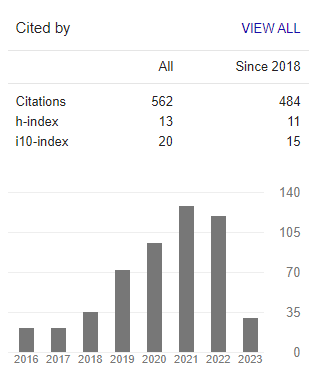DAMPAK EXPERIENTIAL MARKETING TERHADAP MINAT BELI PRODUK IKEA
Abstract
In an era of increasingly fierce competition coupled with the emergence of various kinds of information sources, producers must build good marketing communication to promote their products so consumers can know the quality and the uniqueness of the product. One of the promotional tools is experiential marketing, which has five types of experience, Sense, Feel, Think, Act, and Relate called SEMs (Strategic Experience Modules). This study aims to look at the effect of experiential marketing on the purchase intention of IKEA products. The population is consumers who have visited the IKEA store and are over 22 years old. A sample of 100 people obtained by purposive sampling. By using multiple regression analysis, the results showed that Sense and Act significantly influence purchase intention, and the influence of Sense is more significant than the Act. However, independent variables all together affect purchase intention. The ability of independent variables to explain variations in purchase intention is meager. Therefore other additional independent variables are needed in further research.
To cite this article (7th APA style):
Rosady, N., Suharyanti, & Anitawati, M. Th. (2019). Dampak Experiential Marketing terhadap Minat Beli Produk IKEA [The Impact of Experiential Marketing on Purchase Intention of IKEA Product]. Journal Communication Spectrum, 9(2), 176-188. http://dx.doi.org/10.36782/jcs.v9i2.1986Keywords
References
Chandra, H. (2008). Marketing untuk orang awam. Maxikom.
Chang, T.Z. & Wildt, A. R. (1994). Price, product information, and purchase intention: An empirical study. Journal of the Academy of Marketing Science, 22(1), 16-27.
Dodds, W., Monroe, K., & Grewal, D. (1991). Effects of price, brand, and store information on buyers' product evaluations. Journal of Marketing Research, 28, 307-319.
Engel, J., Kollat, D., & Blackwell, R. (1995). Customer behavior (8th ed.). Dryden Press.
Holbrook, B., & Hirschman, C. (1982). The experiential aspects of consumption: Consumer fantasies, feeling, and fun. Journal of Consumer Research, 9, 132-140.
Hulten, B., Broweus, N., & Van Diyk, M. (2009). Consumer behavior. Palgrave-Macmillan.
International Experiential Marketing Association (2012). www.experientialforum.com.
Khan, I., & Rahman, Z. (2015). Influence of experiential marketing on customer purchase intention: A study of the passenger car market. Management and Labour Studies, 39(3), 319-328. http://doi.org/10.1177/0258042X15572411
Kotler, P., & Amstrong, G. (2008). Principles of Marketing (5th ed.). Pearson Education.
Kotler, P., & Keller, K. (2012). Marketing management (14th ed.). Pearson Education.
Liang, j.-L., Chen, Y.-Y., Duan, Y., Ni, J.-J., & Jinwen. (2013). Gender differences in the relationship between experiential marketing and purchase intention. The Journal of International Management Studies, 8(1), 10-19.
Munthiu, M.-C. (2009). The buying decision process and types of buying decision behavior. Sibiu Alma Mater University Journals. Series A, Economic Sciences, 2(4), 27-33.
Nasermoadeli, A., Ling, K. C. & Maghnati, F. (2013). Evaluating the impacts of customer experience on purchase intention. International Journal of Business and Management, 8(6), 128-138. http://doi.org/10.5539/ijbm.v8n6p128
Pine, I. & Gilmore, J. (1999). The experience economy: Work is theatre and every business is a stage. Harvard Business School Press.
Schiffman, L. & Kanuk, L. (2000). Consumer behavior. Prentice Hall.
Schmitt, B. (1999). Experiential marketing: How to get customers to sense, feel, think, act, and relate to your company and brands. New York: Free Press.
Sekaran, U., & Bougie, R. (2010). Research methods for business: A skill-building approach (5th ed.). John Wiley & Sons Ltd.
Silalahi, U. (2012). Metode penelitian sosial (Volume Ke-3). Refika Aditama.
Todorova, G. (2015). Marketing communication mix. Trakia Journal of Sciences, 13(1), 368-374. http://doi.org/10.15547/tjs.2015.s.01.063
Verhoef, P.; Verhoef, P.C.; Lemon, K.N.; Parasuraman, A.; Roggeveen, A.; Tsiros, M.; Schlesinger, L. A. (2009). Customer experience creation: Determinants, dynamics, and management strategies. Journal of Retailing, 85(1), 31-41. http://doi.org/10.1016/j.jretai.2008.11.001
Wijaya, B. S. (2011). Model Komunikasi Berasa dalam Komunikasi Pemasaran: Studi mengenai Iklan Ambient Media dalam Meraih Kepercayaan Khalayak Konsumen. Journal Communication Spectrum, 1(1), 55-74
Wijaya, B. S. (2016a). The ‘Realness’ Discourse of a Political Leader: A Komunikasi Berasa Perspective. Journal of Government and Politics, 7(2), 310-340. http://doi.org/10.18196/jgp.2016.0031/310-340
Wijaya, B. S. (2016b). Brand Activation dan Komunikasi Berasa. Majalah MIX, 10(13), 42
Yang, C.-Y. (2009). The study of repurchase intentions in the experiential marketing-An empirical study of the franchise restaurant. International Journal of Organizational Innovation, 2(2), 245-261.
Yang, Z.-Y. & He, L.-Y. (2011). The goal, customer experience, and purchase intention in a retail context in China: An empirical study. African Journal of Business Management, 5(16), 6738-6746. http://doi.org/ 10.5897/AJBM10.1287
Refbacks
- There are currently no refbacks.

This work is licensed under a Creative Commons Attribution 3.0 License.
Indexed by:
Archived in:
Listed in:
INTERNATIONAL ASSOCIATION FOR MEDIA AND COMMUNICATION RESEARCH

















